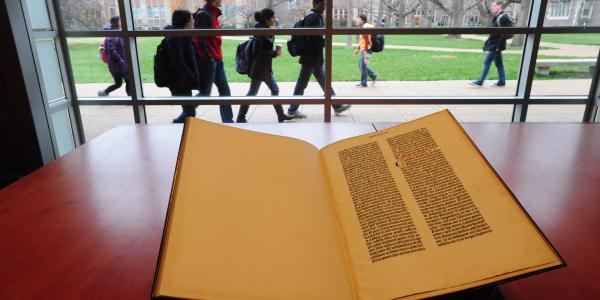R. W. Davis Travel Grant
The History Department supports graduate research and conference participation through R. W. Davis Travel Grants. Awarded on a competitive basis and subject to the limits of department resources, this funding allows students to present papers at academic conferences.
The department will fund reimbursable travel expenses up to $1,300 for a student who is presenting a paper at a conference in North America, and up to $1,800 for presenting at a conference overseas. The department strongly prefers that these be national conferences of major professional organizations, though specialized conferences bearing directly on the student’s research expertise (or other professional development) are also appropriate; regional conferences and graduate student conferences may be funded at a lower rate. This funding is available for presenting a paper at one conference in any given academic year. Support may be available for travel expenses to present a paper at a second conference, depending on the limits of departmental resources.
Students may apply for a Davis Travel Grant by submitting to the Director of Graduate Studies (DGS) a one-page proposal outlining the rationale for their conference plans, along with a budget detailing their reimbursable expenses (conference registration fee, travel, lodging, and meals).
The award is named for Professor Emeritus Richard W. Davis in recognition of his decades of service to Washington University's doctoral program in history.
In addition to the Davis Travel Grants, which are provided by the History Department, students may request an additional $200 in matching funds from the Office of Graduate Studies. Requests for these matching funds should be submitted to the DGS at the same time as the application for a Davis Travel Grant. If approved by the DGS, they will be forwarded to the Office of Graduate Studies for review.
Deadline: Rolling
Maximum amount: $1,300* for North America/$1,800* for international conference; one conference per academic year, with possible funding for second conference.
Apply to: DGS
*Award amount has been increased to $1,300/$1,800 as of July 1st, 2023. Previous amounts were $700/$1,000.
Professional Travel Grant
The History Department supports graduate students’ professional development through participation in appropriate conferences, where they may learn of the latest research in their field and make contact with scholars at other institutions. This funding is awarded on a competitive basis and subject to the limits of department resources.
The department will fund reimbursable travel expenses up to $800 for a student who is participating in a conference for professional development purposes. The department strongly prefers that these be national conferences of major professional organizations, though specialized conferences bearing directly on the student’s research expertise (or other professional development) are also appropriate.
Students may apply for this professional development travel support by submitting to the Director of Graduate Studies a one-page proposal outlining the rationale for their conference plans, along with a budget detailing their reimbursable expenses (conference registration fee, travel, lodging, and meals).
Deadline: Rolling
Maximum amount: $800**
Apply to: DGS
**Award amount has been increased to $800 as of July 1st, 2023. Previous amount was $500.
Dissertation Travel Funds (Office of Graduate Studies in Arts & Sciences)
The Office of Graduate Studies in Arts & Sciences provides dissertation travel funds in the amount of $1,000 to support research-related travel or travel to conferences by students who are completing their dissertations. Students who are fully funded by a University Fellowship, are working on their dissertation, and have finished all their coursework and all required examinations (qualifying, foreign language, etc.) other than the oral defense are eligible to request this travel support. Funds are available at the beginning of August for fall and the beginning of January for spring and will remain available until they are exhausted or the student graduates, whichever comes first.
Certain restrictions apply:
- Students funded by an Olin Fellowship, Chancellor’s Graduate Fellowship, or a non-GS source (such as a McDonnell International Scholars Academy Scholarship) are NOT eligible for the dissertation travel fund.
- If a student lives outside of St. Louis, the award may not be used for travel between their residence and St. Louis.
- The dissertation travel fund may NOT be combined with a travel reimbursement request.
Requests for dissertation travel funds should be submitted to the Director of Graduate Studies by March 31. The DGS will forward appropriate requests to the Office of Graduate Studies in Arts & Sciences, which makes the final decision on all requests for dissertation travel funds.
Deadline: March 31
Apply to: DGS; requires approval by Office of Graduate Studies in Arts & Sciences

